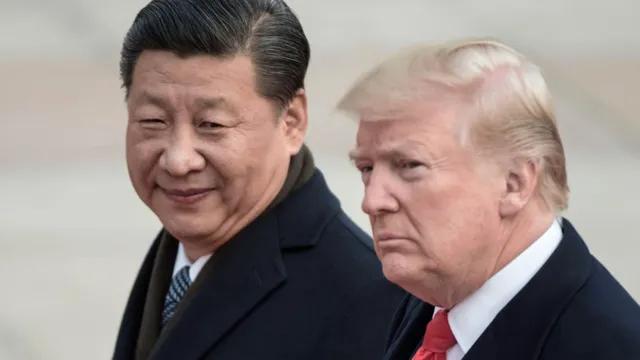
Trump softens stance, lowers expectations on China tariffs
2025-04-24 00:00- President Trump softened his tone regarding tariffs on Chinese goods, suggesting they would not be as high as previously announced.
- Treasury Secretary Scott Bessent indicated the current high tariff rates are unsustainable and detrimental to trade.
- Investors reacted positively, with the stock market rallying on hopes for reduced tensions and increased trade negotiations.
Express your sentiment!
Insights
In the United States on April 22, 2025, President Donald Trump indicated a shift in his approach to tariffs on Chinese imports. During remarks at the Oval Office, he suggested that the final tariffs would not reach the previously proposed 145%. This shift followed Treasury Secretary Scott Bessent's comments about the unsustainable nature of the high tariffs and their impact on trade, describing the situation as equivalent to a trade embargo. Bessent expressed optimism that trade tensions might ease in the near future, although full agreements might take years, implying a need for negotiations to seek a resolution. These developments led to a rally in the stock market as investors reacted favorably to the possibility of de-escalation. Stocks saw significant gains, with the Dow Jones Industrial Average rising over 1,000 points. The U.S. futures market and Asian markets also experienced upsurgence in response to these statements. Analysts believe that a more conciliatory approach from Trump towards China could stabilize market fears and reduce risks of economic slowdown caused by prolonged trade disputes. As negotiations between the U.S. and China progress, the shifting tariff strategy reflects Trump's larger aim of securing favorable outcomes without causing further market disruptions, projecting a commitment to finding common ground rather than maintaining a hardline stance that stifled trade.
Contexts
The impact of tariffs on the US stock market has been a topic of significant debate among economists and investors alike. Tariffs, which are taxes imposed on imported goods, are often used by governments to protect domestic industries from foreign competition and to generate revenue. However, the consequences of implementing tariffs can be multifaceted and can lead to both positive and negative effects on the stock market. Understanding these implications is crucial for investors and policymakers in navigating economic landscapes affected by trade policies. When increased tariffs are announced, the initial market reaction often includes increased volatility, as investors assess the potential impacts on various sectors. Industries directly affected by tariffs, such as manufacturing and agriculture, may experience a decline in stock prices due to increased costs of raw materials and potential retaliatory measures from trading partners. For instance, companies that rely heavily on imports may see their profit margins squeezed, leading to lower earnings expectations, which can negatively impact their stock prices. Conversely, domestic industries that stand to benefit from reduced foreign competition may experience a rise in stock prices, creating a dichotomy that can complicate overall market trends. Furthermore, the broader economic implications of tariffs can influence investor sentiment and market performance. As tariffs can lead to inflationary pressures, consumers may face higher prices for goods, which can dampen consumer spending and slow down economic growth. This, in turn, might trigger concerns about the health of the economy, prompting investors to reevaluate their positions and possibly sell off stocks, leading to a broader market downturn. Historical data has shown that periods of heightened tariff activity often correlate with increased market uncertainty, making it essential for investors to remain vigilant and informed about ongoing trade negotiations and policies. In conclusion, the relationship between tariffs and the US stock market is complex and requires careful analysis. While tariffs can offer protection to certain domestic industries, they can also introduce risks that affect overall market stability. Investors must consider the broader economic context of tariff implementation and its potential ripple effects on consumer behavior and corporate profitability. As such, both short-term and long-term investment strategies should adapt dynamically to the evolving trade landscape.